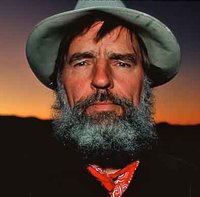
Today, March 14, is the 30th anniversary of the death of Edward Abbey, the incandescent essayist and novelist of the American West, who gave us a classic in each of those genres. Desert Solitaire, a memoir of his years as a ranger at Arches National Park in Utah, established Abbey's reputation as "a voice crying in the wilderness, for the wilderness." The Monkey Wrench Gang is a rip-snorting novel about a gang of eco-saboteurs who set out to blow up the Glen Canyon Dam so that the Colorado River could again run free through the red rock canyons of Arizona and Utah.
For my baby boom generation, Desert Solitaire is as vividly provocative as Henry David Thoreau's Walden. I will always associate Abbey with two of his most pointed observations. Both had to do with the threat that population growth presented to the natural world. One became connected to a 2004 effort to push the Sierra Club to advocate for immigration limits along with birth control in order to stabilize the U.S. population.
One of the leaders of that effort was Sierra Club board member Ben Zuckerman, a renowned UCLA astronomer and physicist. Zuckerman, whom I met five years ago when he joined a CIS trip to the Texas borderlands near Big Bend National Park, is a passionate environmentalist who has been known to eschew air travel in order to reduce his carbon footprint. As the 2004 campaign unfolded at the club, Zuckerman quoted Abbey's commentary that "Growth for the sake of growth is the ideology of the cancer cell."
That invocation of Abbey's concerns drew the outraged, chest-thumping attention of Mark Potok, a member of the Southern Poverty Law Center's thought-crime unit, which goes by the ironic name of "The Intelligence Project". For Potok it was a smoking gun, the rhetorical weapon in crimes of xenophobia, bigotry, and racism. "Zuckerman has compared immigration to cancer," Potok thundered as he issued the verdict of the SPLC's kangaroo court. You've heard of guilt by association, a specialty of the SPLC. Call this guilt by quotation.
My other indelible Abbey memory dates back to March 1981, when he reviewed a book I had written. Titled The Second Long Walk, it was a political and cultural history of a bitter land dispute between the Navajos and the Hopis over high-desert rangeland east of the Grand Canyon.
In his review for the New York Times Book Review, Abbey was less interested in the land dispute than he was in what he called "the rude, brutal, distasteful truth" of the rapid growth of the Navajo population. "The Navajos have outbred their range," he wrote. Then he connected Navajo demography to the growth of the population of the United States. "The struggle of the Navajos and Hopis over a small piece of real estate, precious to both, provides the rest of us with an interesting preview of what may lie ahead for all Americans."
Abbey's assessment was too harsh for my tastes. But his fundamental point about the environmental effects of overpopulation was a valid one. And when he later came up with the cancer analogy, he set the stage for an attack on Ben Zuckerman that was an interesting preview of the vicious, malicious, intellectually and morally bankrupt attacks on immigration restrictionists that have been become a centerpiece of the SPLC's business plan to coax contributions from donors who have good intentions, but who don't understand what they have financed.
